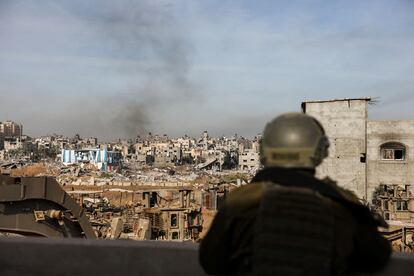Israel withdraws ground troops from southern Gaza
The army said it had achieved its military objectives in Khan Younis and would shift strategy to favor ‘targeted incursions.’ Military sources deny that the decision is due to pressure from Washington


The Israeli army on Sunday announced the withdrawal of its ground troops in southern Gaza, on the day that marks six months since the start of the war in the Palestinian enclave following the Hamas attacks on Israel on October 7, 2023. Military sources quoted by the Israeli press justified the decision on the grounds that the army has already achieved its goal of dismantling the Hamas structure in Khan Younis, the southern Gaza city where Israeli troops have been fighting for four months. They also alluded to a change of tactics to favor “targeted incursions,” such as those carried out in the north of the territory, instead of a continuous presence on the ground in the south. The sources, quoted by the Haaretz newspaper, denied that the decision had been made due to a U.S. demand on the government of Israeli Prime Minister Benjamin Netanyahu.
This denial alludes, without specific mention of it, to the telephone conversation held last Thursday between U.S. President Joe Biden and Netanyahu, four days after an Israeli attack on a World Central Kitchen convoy killed seven aid workers, six of whom were Westerners, and one an American citizen. Washington’s anger and its consequent pressure on Netanyahu after the aerial attack on three of the NGO’s vehicles, which were clearly identified and whose route had been provided to the Israeli military authorities, forced the Netanyahu government to make the first concessions in this war.
Those concessions, such as the promise to open the Erez border crossing in northern Gaza and to use the port of Ashdod to unload humanitarian aid, were minimal, but Netanyahu had so far refused to acquiesce to them despite the appeals of the United Nations and international aid agencies, which have issued repeated warnings that the population of the Strip faces a “catastrophic” humanitarian situation and is on the verge of a famine. In six months of war, more than 33,000 Palestinians have perished in the Strip. At least 13,000 are children, according to UNICEF.
The decision to withdraw the Israeli army’s 98th Division from southern Gaza comes after Israel has been threatening for weeks to stage a ground offensive in Rafah, the city on the border with Egypt where more than 1.4 million displaced Gazans are crowded together. The Biden administration has not explicitly opposed such an offensive, but Washington has made it conditional on the protection of the civilians sheltering there, a condition which the United Nation believes impossible to meet.
“All intelligence and combat operations in the region” have been achieved, said the sources quoted by Haaretz, who stressed that the 98th Division, which has now left the territory, has “dismantled Hamas’ Khan Younis brigades and killed thousands of its members.” The same sources added “there’s no need for us to remain in the sector without an [operational] need… We did everything we could there.”
According to the Israeli daily, the Israeli army plans to permanently station three divisions on the Gaza border in the future, from where “army forces will be able to deploy into the Strip whenever needed.” The sources added that the departure of troops from Khan Younis will allow displaced Palestinians to return to their homes after taking refuge in Rafah.
Another Israeli newspaper, The Times of Israel, quoted Israeli military intelligence sources Sunday as saying that the operation has convinced the Israeli army that what it defines as “targeted raids,” similar to the one that took place in the Al Shifa hospital, are of more strategic use in the fight against Hamas.
In these six months of war, the Israeli army claims to have killed more than 13,000 members of Hamas in Gaza, in addition to some 1,000 militiamen of the fundamentalist group and others, such as Islamic Jihad, which was also involved in attacks in Israel on October 7 in which 1,200 people were killed and another 240 taken hostage. Of these, about half are still captive in Gaza and a third are believed to have been killed.
However, the image of total victory over Hamas with which the Netanyahu government justifies the war continues to elude Israel. The Israeli government has not been able to prove that it has killed any prominent Hamas leaders. Above all Yahya Sinwar, one of the masterminds of the October 7 attacks, is believed to be still alive somewhere in Gaza. Meanwhile, Netanyahu faces growing unpopularity, not so much because of the 33,000 Gazans killed in the war, but because of the fate of the hostages and his inability to restore the sense of security that Israelis had before the Hamas attacks. Some 88% of Israeli Jews support the military offensive and more than half oppose the entry of humanitarian aid into Gaza as long as there are hostages remaining in the Strip.
On Saturday, almost 100,000 protesters gathered in Tel Aviv to demand Netanyahu reach an agreement with Hamas to free the hostages, which Israel has been negotiating in Cairo for weeks without results. Hamas confirmed that it will send a delegation to the Egyptian capital for a new round of talks to reach a ceasefire agreement, under the mediation of Egypt, Qatar, and the United States.
Israel is also facing the threat of Iranian reprisals for the attack on the consulate and residence of the Iranian ambassador in Damascus, the Syrian capital, last Monday, in which 10 people were killed, three of them senior members of the Islamic Revolutionary Guard. Israeli Defense Minister Yoav Gallant said Sunday that Israel “has completed preparations to respond to any scenario that may unfold with Iran.” An advisor to Iran’s supreme leader, Ayatollah Ali Khamenei, said that Israeli embassies “are no longer safe,” suggesting a possible attack on Israeli diplomatic legations.
Sign up for our weekly newsletter to get more English-language news coverage from EL PAÍS USA Edition
Tu suscripción se está usando en otro dispositivo
¿Quieres añadir otro usuario a tu suscripción?
Si continúas leyendo en este dispositivo, no se podrá leer en el otro.
FlechaTu suscripción se está usando en otro dispositivo y solo puedes acceder a EL PAÍS desde un dispositivo a la vez.
Si quieres compartir tu cuenta, cambia tu suscripción a la modalidad Premium, así podrás añadir otro usuario. Cada uno accederá con su propia cuenta de email, lo que os permitirá personalizar vuestra experiencia en EL PAÍS.
¿Tienes una suscripción de empresa? Accede aquí para contratar más cuentas.
En el caso de no saber quién está usando tu cuenta, te recomendamos cambiar tu contraseña aquí.
Si decides continuar compartiendo tu cuenta, este mensaje se mostrará en tu dispositivo y en el de la otra persona que está usando tu cuenta de forma indefinida, afectando a tu experiencia de lectura. Puedes consultar aquí los términos y condiciones de la suscripción digital.








































